Related Research Articles

Duke of Argyll is a title created in the peerage of Scotland in 1701 and in the peerage of the United Kingdom in 1892. The earls, marquesses, and dukes of Argyll were for several centuries among the most powerful noble families in Scotland. As such, they played a major role in Scottish history throughout the 16th, 17th, and 18th centuries. The Duke of Argyll also holds the hereditary titles of chief of Clan Campbell and Master of the Household of Scotland.
John Campbell may refer to:

Archibald Campbell, 1st Duke of Argyll, 10th Earl of Argyll was a Scottish peer.
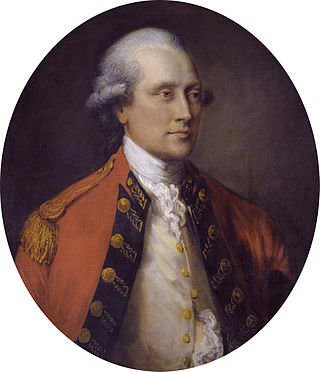
Field Marshal John Campbell, 5th Duke of Argyll, styled Marquess of Lorne from 1761 to 1770, was a Scottish soldier and nobleman. After serving as a junior officer in Flanders during the War of the Austrian Succession, he was given command of a regiment and was redeployed to Scotland where he opposed the Jacobites at Loch Fyne at an early stage of the Jacobite Rebellion and went on to fight against them at the Battle of Falkirk Muir and then at the Battle of Culloden. He later became adjutant-general in Ireland and spent some 20 years as a Member of Parliament before retiring to Inveraray Castle.
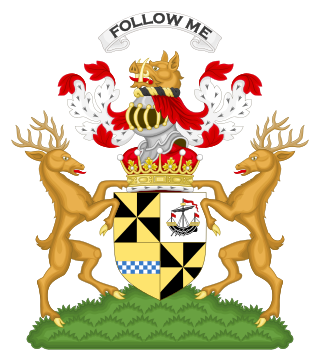
Earl of Breadalbane and Holland is a title in the Peerage of Scotland. It was created in 1681 for Sir John Campbell, 5th Baronet, of Glenorchy, who had previously been deprived of the title Earl of Caithness.
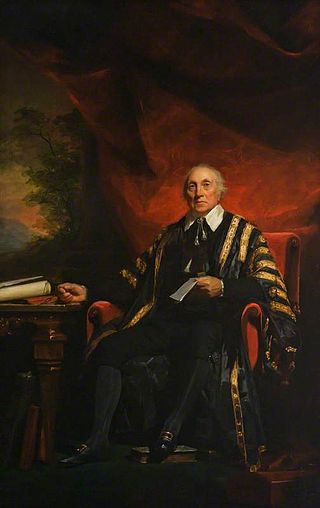
Lord Frederick Campbell was a Scottish nobleman and politician. He was Lord Clerk Register of Scotland, 1768–1816; Member of Parliament (MP) for Glasgow Burghs (1761–1780) and for Argyllshire (1780–1799).
Extraordinary Lords of Session were lay members of the Court of Session in Scotland from 1532 to 1762, and were part of the historical judiciary of Scotland.
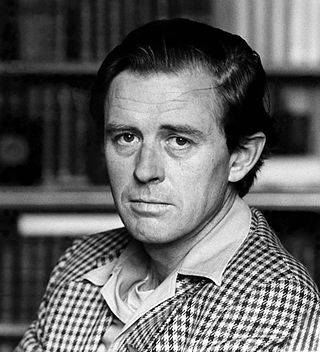
Ian Campbell, 12th and 5th Duke of Argyll,, styled Marquess of Lorne between 1949 and 1973, was a Scottish peer and Chief of Clan Campbell. He was the 12th Duke of Argyll in the Peerage of Scotland, 5th Duke of Argyll in the Peerage of the United Kingdom and Lord Lieutenant of Argyll and Bute.
Sir James Campbell, 2nd Baronet of Ardkinglass, was a British Army officer and Scottish politician who sat in the Parliament of Scotland from 1703 to 1707 and in the British House of Commons from 1707 to 1741.

Major-General Sir Guy Campbell, 1st Baronet, was a British Army officer. His branch of the Campbell baronets is referred to as St Cross Mede.

The Campbell of Auchinbreck family was founded by Duncan Campbell in Glassary, Argyll, Scotland. He was the son of Lord Duncan Campbell, first Lord Campbell of the Clan Campbell, by his second wife Margaret, daughter of Sir John Stewart of Blackhall, the illegitimate son of King Robert III of Scotland. The family of the Lords Campbell later became Dukes of Argyll, and remain chiefs of Clan Campbell. Duncan Campbell, as a grandson of King Robert III, received a considerable estate confirmed by royal charter dated 19 June 1452. The family remained at their estate of Auchinbreck, from which they took their title, until 1641. The Campbells of Auchinbreck were commissioned to provide military training and were used by the Earls of Argyll as military support. In 1628 the then head of the family of Campbells in Auchinbreck received a baronetcy, which included a grant of North American land in Nova Scotia.
General Sir James Steuart Denham, 8th and 4th Baronet was a Scottish soldier of the British Army.
James Stuart, of Torrance, Lanarkshire, was a Scottish officer in the British Army and a politician who sat in the House of Commons between 1734 and 1741..
Colonel John Campbell, of Shawfield and Islay was a Scottish soldier in the British Army. After his early death, his widow Lady Charlotte Bury achieved fame as a diarist and novelist. He was also briefly a politician.

General Duncan Campbell of Lochnell was a Scottish soldier and Whig politician from Argyll. An officer in the Duke of Argyll's regiment of the British Army, he sat in the House of Commons for nine years in the interest of George Campbell, 6th Duke of Argyll.

Ardkinglas House is a Category A listed country house on the Ardkinglas Estate in Argyll, Scotland. The estate lies on the eastern shore of Loch Fyne, and the house is located close to the village of Cairndow. Dating back to the 14th century and originally a Campbell property, the estate now covers more than 12,000 acres (4,900 ha) of rolling hills and landscaped parkland. The centre of the estate was Ardkinglas Castle until this was replaced by a new house in the 18th century. This house was itself replaced by the present Ardkinglas House in the early 20th century, designed by Sir Robert Lorimer for Sir Andrew Noble. It remains the property of the Noble family, and is open to the public on a limited basis. The woodland gardens are open all year round.

Baron of Lundie is a nobility title in the Baronage of Scotland.
Lieutenant-General Robert Skene (1719–1787) was a British Army officer and politician who sat in the House of Commons between 1779 and 1787.
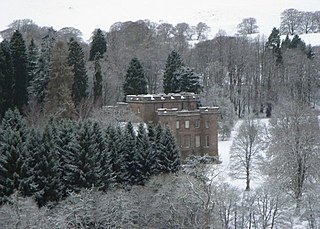
General Alexander Campbell of Monzie Castle, Perth was a British Army general and Member of Parliament.
General Campbell may refer to:
References
- ↑ "Gordon MacGregorRed Book of Scotland Campbell of Ardkinglass p.9" (PDF). Archived from the original (PDF) on 30 August 2017. Retrieved 30 August 2017.
- 1 2 3 "LIVINGSTON, Adam (c.1723-95), of Bantaskine, Stirling". History of Parliament Online. Retrieved 20 August 2017.
- ↑ Falkirk Community Trust